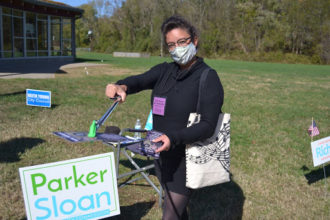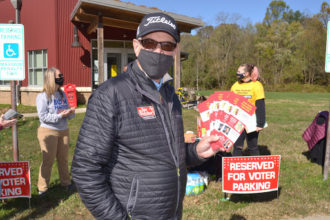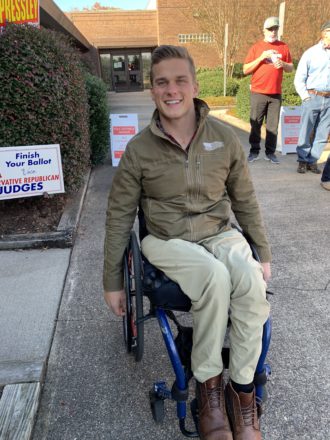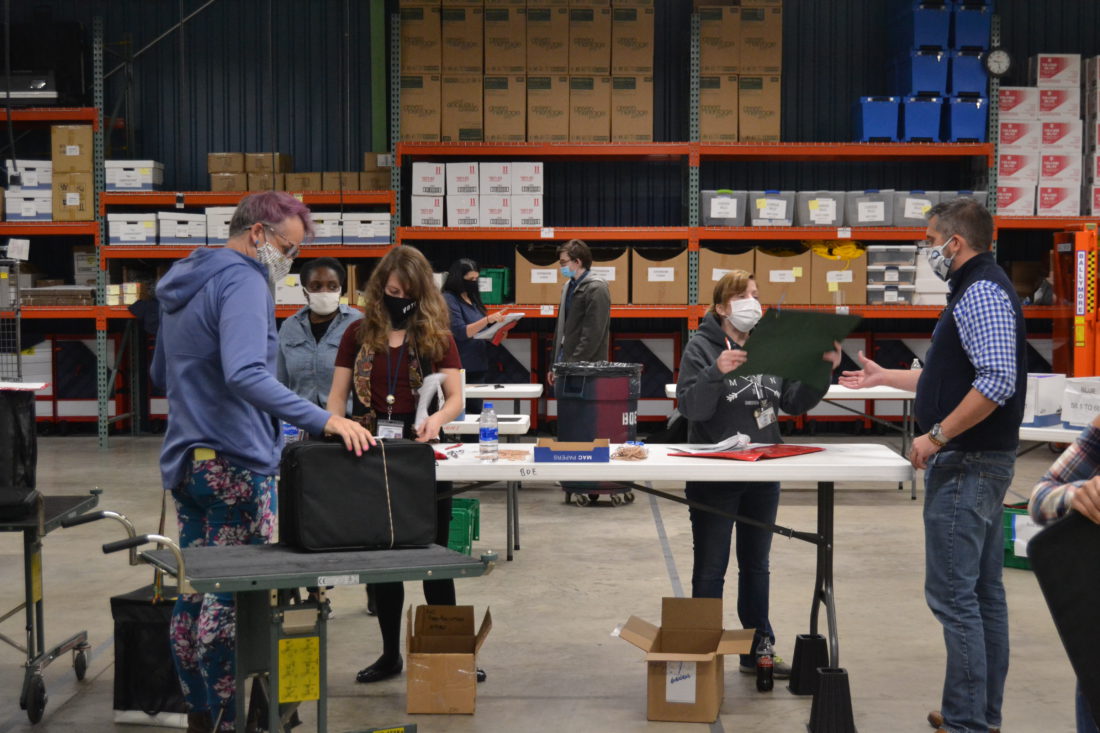While the nation is waiting for millions of votes to be counted in the presidential election, Buncombe County’s scores are mostly settled. Unofficial results from the N.C. State Board of Elections — which lack only provisional ballots and mail-in ballots postmarked by Nov. 3 that will have arrived at the Buncombe County Board of Elections by Thursday, Nov. 12 — point to clear winners in all but a couple of the races to represent county residents.
Below, Xpress has compiled key takeaways from each of the contests previously included in our general election voter guide. As a reminder, the county board of elections will not officially certify results until Friday, Nov. 13, and the state board will not issue certification until Tuesday, Nov. 24. Live coverage from election night is available at this link.
Asheville City Council

Kim Roney, who finished third in unofficial results, used an extendable tool to hand out flyers while maintaining social distancing from voters at the Dr. Wesley Grant Sr. Southside Center on Election Day. Photo by Laura Hackett
For the first time in history, Asheville’s governing body may consist entirely of women. The top three finishers in the unofficial results — Sandra Kilgore, Sage Turner and Kim Roney — are likely to join Mayor Esther Manheimer, Vice Mayor Gwen Wisler and members Antanette Mosley and Sheneika Smith.
With the ouster of incumbent Keith Young, however, Council’s racial makeup will remain unchanged as it considers topics such as the fate of the Vance Monument, funding for the Asheville Police Department and community reparations for African Americans. Kilgore will replace Young as the body’s third Black member; the remaining four members are white.
Rich Lee finished in fifth but still earned over 19,000 votes, nearly twice as many as the previous Council vote record of 10,531 set by former member Vijay Kapoor in 2017. The high turnout was likely driven by the shift to even-year elections established in a 2018 state law, a change Manheimer had requested of Sen. Terry Van Duyn, D-Buncombe.
Buncombe County Board of Commissioners
Democrats secured their hold on Buncombe County government with victories in each of four races for the county Board of Commissioners. Robert Pressley, who represents District 3 and was not up for reelection, will be the lone Republican on the seven-member body.
Pressley did, however, lose his bid to unseat incumbent Brownie Newman as the board’s chair. Earning just over 42% of votes counted thus far, Pressley had a somewhat better showing than did sheriff candidate Shad Higgins, the last Republican to run in an opposed partisan race for countywide office, in 2018. Higgins took roughly 35% of ballots in a three-way contest with Democratic winner Quentin Miller and Libertarian Tracey Debruhl.

In the three district races, Democrats benefited from redrawn lines that more evenly distributed representation of Asheville’s liberal-leaning urban core. Terri Wells defeated Glenda Weinert in District 1, incumbent Jasmine Beach-Ferrara bested fellow incumbent Anthony Penland in the contest for a double-bunked District 2 seat, and first-time candidate Parker Sloan beat incumbent Joe Belcher in District 3. As of press time, all three races had margins of over 9,000 votes in favor of the Democrats.
Speaking with Xpress on Nov. 3, Newman said the commanding Democratic majority would allow the board to pursue policies “that represent the goals and values of the community.” He named renewable energy, affordable housing and land use as three key areas for action.
Buncombe County Board of Education and Conservation District Board
Based on unofficial results, the closest race in Buncombe County is that for the Board of Education’s Owen District. Incumbent Peggy Buchanan currently holds a lead of less than 250 votes over Linda Tatsapaugh; both are trailed substantially by Everett D. Pittillo.
Buchanan cast the deciding vote in the board’s Oct. 1 decision to resume in-person instruction for high schoolers, while Tatsapaugh has emphasized the need for schools to continue remote learning options during the COVID-19 pandemic. Tatsapaugh also held the race’s fundraising lead and the backing of the Buncombe County Association of Educators.
According to state election law, recounts may be requested “if the difference between the votes for the requester and the winning candidate is less than or equal to 1% of the total votes cast in the election.” The difference between Buchanan and Tatsapaugh currently falls into that margin.
The other contested Board of Education race yielded a clear victory for Amanda Simpkins, who nearly doubled the vote total of challenger Mark Watman. And incumbent Gary Higgins will return to the Buncombe County Soil and Water Conservation District Board of Supervisors after earning over 75% of the vote against perennial candidate and contraception advocate Alan Ditmore.
N.C. General Assembly
The status quo remained unchanged as the results of local races for the state Senate and House of Representatives came in.
District 48 Sen. Chuck Edwards, R-Henderson, took nearly 59% of the vote in his contest to continue representing eastern Buncombe, Henderson and Transylvania counties. His opponent, Brian Caskey of Mills River, serves as mayor pro tem of that town.
In a statement, Edwards said, “Whether you voted for me or not, it is my hope to work with you — and for you — to rebuild our economy, invest in the future of our children, protect your hard-earned money and keep our citizens safe.”
In District 49, which encompasses the western two-thirds of Buncombe County, Democrat Julie Mayfield will take the reins from outgoing Sen. Van Duyn, whose run for lieutenant governor ended with a primary loss in March, after handily defeating Republican Bob Penland. Mayfield currently serves on Asheville City Council.
Reached before all state election returns had been received on the evening of Nov. 3, Mayfield said her plans for the office would be shaped by the balance of power in the legislature, which some polls had predicted could shift out of Republican hands. Based on current vote counts, that doesn’t appear to have happened; Mayfield will thus function as a member of a Democratic minority as she pushes priorities such as Medicaid expansion, independent redistricting and education funding.

The entirety of Buncombe County’s House delegation, all Democrats, won reelection with the following vote totals:
- Rep. Susan Fisher, District 114, 58%
- Rep. John Ager, District 115, 62%
- Rep. Brian Turner, District 116, 62%
U.S. House of Representatives District 11
Arguably the election’s most glittering local prize, the congressional seat formerly held by Republican Mark Meadows (now the White House Chief of Staff) went to 25-year-old Republican Madison Cawthorn of Henderson County.
Although Cawthorn’s Democratic opponent, Moe Davis, dominated District 11’s population center of Buncombe County with over 58% of the vote, the Republican ran up large margins in ever other county and held over 54% of the total as of press time. That disparity was most pronounced In rural Graham County, where Cawthorn earned over 77% of the vote. Libertarian DeBruhl and the Green Party’s Tamara Zwinak each received less than 2% of the votes cast across the district.
Davis conceded the race on election night by thanking voters and volunteers. “The voters have spoken and while I’m disappointed, I respect their decision,” he said.
Cawthorn, meanwhile, celebrated his victory with a three-word tweet: “Cry more, lib.”



I hear Chad Nesbitt won several races where he wasn’t even on the ballot. Is that true?
I learned a lot in this election. Western North Carolina will suffer for not vetting candidates who FAIL to fill out their Financial Disclosure Statements to run for Federal Office.
Nobody in the media did their job EARLY in the campaign to ask candidates WHY the candidate failed to answer questions. Media failed to ask WHEN will the candidate amend the forms to be accurate and complete.
Then, the media failed to ask WHY was this information hidden in the first place.
Also, I learned the amount of money spent on a campaign is disgusting. We should TAX (and TAX HEAVILY!) Super PACs doing ANYTHING within the District.
10% off the top! 17 Counties in Western North Carolina would have collected $623,000.00 in 10 months.
TOTAL LIST OF SUPER PACS $ SPENT: https://projects.propublica.org/itemizer/races/2020/states/nc/house/11